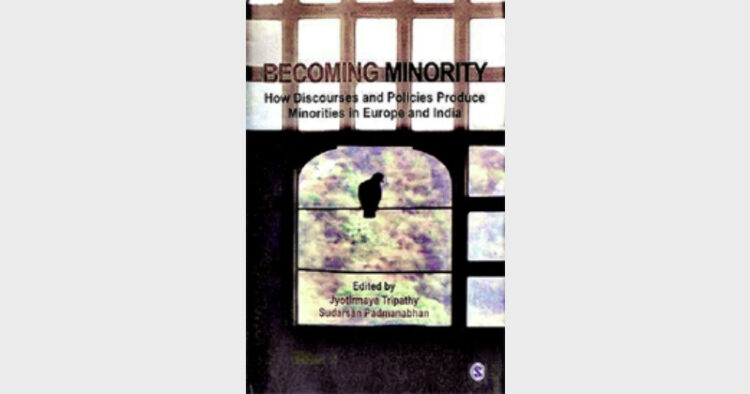Becoming Minority: How Discourses and Policies Produce Minorities in Europe and India; Jyotirmaya Tripathy and Sudarsan Padmanabhan (Eds.); Sage Publications;
Pp 353; Rs 795
In an effort to provide an answer to the vexing issue of minority and minoritisation, the different contributors to this volume, which has been ably edited by two professors of social sciences, draw upon European and Bharateeya experiences of cultural diversities because these regions are two of the most culturally diverse regions of the world to engage with diversity from within a democratic framework. Some of the social science concepts – like minority, ethnicity, inclusion, exclusion and self-determination, among others – are addressed in order to create a common platform from where both Europe and Bharat can articulate themselves vis-à-vis their minority practices.
In the first part of the book, titled ‘The Making of Minority’, the two editors, Tripathi and Padmanabhan, discuss minority politics in post-Cold War Europe and post-Independence Bharat where, during the time of elections, opportunities are created for politicians and intellectuals to accentuate the minority difference for their personal gains. Chapter 2 presents Barabara Franz’s article which focuses on the minorities of Central Europe, emphasising the importance of certain ethnic minorities within the processes that led to the creation of modern nation states. Chapter 3 by Lajwanti Chatani explores the framework of justice on which the rights of minorities rest and argues that justice can be discursive and any attempt to free it would rid it of its empowering credo.
|
New Arrivals A Tale of Two Prime Ministers; Justice SN Aggarwal; Universal Law Publishing; Pp753; Rs1,095 This book brings into focus that anything which is legally correct may not pass the test of moral or ethical values. It relates to two former Prime Ministers, Indira Gandhi and PV Narasimha Rao, who won in the law courts but lost in the public Court. Police Administation under the British Rule: In the Northern Range of the Madras Presidency 1924-47 Dr B Roja; Gyan Publishing House; Pp 384; Rs 495 This book provides a mechanism for understanding the important role played by the police, its characteristics of use of both force and consent in maintaining British rule. It is intended to provide a good understanding for those pursuing academic research and also useful to the general readers also. Connectivity and Integration in South Asia; Edited by Mohanan B Pillai and Adluri Subramanyam Raju; Kalpaz Publications; The contributors in this volume focus on the problems being faced by the South Asian countries and suggest amicable solutions to enhance economic cooperation amongst them. The volume tries to visualise a new South Asia free from conflicts, thereby improving the welfare of the people in the region. Agripreneurship for Employment and Empowerment of Women in Rural Areas; G Valentina; GenNext Publications; Pp 292; Rs 940 The book provides a platform for women entrepreneurs to share their experiences, discern role of technology in promoting employment and empowerment and debate on initiatives made by government in promoting Agripreneurship in women. |
Chapter 4, in the second part of the book, by Abdoulaye Gueye explains the presence of racial minority with emphasis upon blackness in contemporary France and argues that blackness is less an essence than a sociological outcome. Chapter 5 by Ulf Morkenstam analyses Swedish Sami politics during the current century while specifically focusing on how the indigenous Sami people have been constructed in discourse. Chapter 6 outlines how the 1997 devolution for Scotland proved an institutional resource for the Scottish national movement. Chapter 7 maps the rivalry between the Greek Orthodox majority and a Turkish/Muslim minority in Western Thrace on the northeast border of Greece. Chapter 8 argues that social construction of “thick minority identities in Denmark in the 1990s” can be seen in relation to the cultural war of value strategy aimed at domestic political opponents. Chapter 9 shows that migrant hostile policies and dominant discourses in Netherlands create fertile breeding ground for “ethno-manufacturing”. Chapter 10 says that speeches by Enoch Powell in the late 1960s reflected a ‘traditional’ stance towards immigrants as well as a concern for the demographic change taking place in England from the mid-1950s.
In Chapter 11, Part 3, BN Mohapatra analyses the historical contacts through which discourses on minorities evolved in Bharat. Chapter 12 by Mohammed Mehdi discusses the concept of hurt religious feelings and the corresponding politics of outrage in relation to what it means to be Muslim in the Bharateeya context. Chapter 13 by Malavika Menon complains that members drafting the Bharateeya Constitution gave Bharateeya minorities certain rights but stopped short of addressing the crucial question as to who a minority is.
Chapter 14 by Shireen Mirza links urban space and Waqf properties to describe the creation of a segregated Shia Muslim quadrant in Hyderabad’s old city. Chapter 15 by Anjana Raghavan deals with the ideological construction and production of minor-ness, both as a category and an identity marker vis-à-vis the mythologised and origin narratives of Tamil identity. The book is reader-specific and meant essentially for policy-makers and research scholars in social sciences.
Manju Gupta (The reviewer is former editor of NBT)














Comments